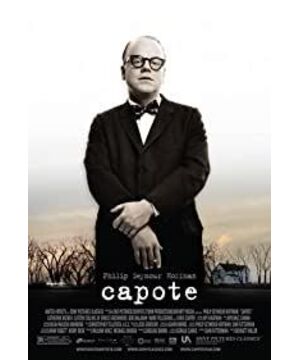"... Few things in the world have an ending. Isn't the vast majority of lives just a series of incomplete fragments?" In 1948, Truman Capote wrote in "Other Voices, No "The Room" reads. At this time, Capote, who was only 23 years old, had already become a rising star in the literary world. He has a keen sensitivity to words and can capture subtle emotional changes.
In 1959, Truman Capote found a piece of news in the New York Times: A family of four farmers in Kansas City was murdered. Inspiration was immediately stimulated. In the following six years, Capote kept going deep into the incident, visiting a large number of people related to the case, and witnessing the detection, interrogation, and execution of this murder case and other important links.
In 1966, the novel "Cold Blood" based on this incident was published. This novel pioneered the writing style of "non-fiction novel" and was hailed as "a watershed in contemporary American literature", and Capote became a "watershed" for this reason. Founder of "Non-fiction Literature".
"Cold Blood" made Truman Capote, giving him the long-awaited reputation and wealth. However, in Capote's life, this is just a glorious fragment. However, "Cold Blood" also cast a huge shadow in his life, preventing him from continuing to write.
In 1984, Truman Capote died at a friend's house due to excessive alcoholism. How to define Capote’s death, whether it is the ecstasy of reaching the peak of creation, or the gloomy depression in the "cold-blooded" mire...Perhaps, when he cut the news from the newspaper, He has already begun to die.
In 2005, American director Bennett Miller shot a film called "Capote", which reproduced the life of gay writer Truman Capote and the writing process of "Cold Blood".
"Capote" is a very typical biographical film. The director Bennett Miller portrayed a realistic Truman Capote, and the actor Philip Seymour Hoffman won with his superb performance. The best actor at the 78th Academy Awards and the best actor at the 63rd Golden Globe Awards.
When we watched this movie, we saw not only the short life of a writer, but also a journey into Capote's sensitive and cold heart. He knew about a murder case and used it as the beginning of his creation and gradually penetrated into the case. He and the murderer Perry became friends, and they became friends in a long conversation, but he also knew that the murderer must be severely punished.
Through chatting, he learned about Perry's childhood life, and they are surprisingly similar. Capote told his friend that he and Perry seemed to live in the same family. He came out through the front door, but Perry went through the back door. In a sense, they share the same life. They are marginalized by mainstream society, where there is abandonment, suicide, violence and despair. Capote used literature to find the meaning of life, but Perry lost himself in misfortune.
In the movie "Capote", we can understand the source of the "non-fiction" style, and at the same time, we can also know the secret temptation in non-fiction: the game of good and evil.
Writer and murderer
When Capote met Perry for the first time, he was fascinated by Perry's unique temperament, which was the tacit understanding between the two men and the breath of death. Perry in the case was the youngest child in the family. Growing up, he did not receive more care from his family. Instead, he witnessed the death of an alcoholic mother from his own suffocation, and his brother and sister died when they were young. His only relative is his little sister who doesn't love him. For his father, Perry's feelings are very complicated. He loves his father, but this love cannot be expressed.
Childhood years have created Perry's extreme, sensitive, and cold personality. No one cares how he feels, and he doesn't care how others feel. For this world, Perry has nothing but hate. However, Perry is also a very gentle person. He likes to travel, often writes a diary, likes music, and has an artistic talent.
When the writer Capote approached Perry, he found that Perry was himself in the dark, although he never admitted, even though he considered himself a writer with superb writing skills, Perry still disintegrated him little by little. Pretending to be strong. Capote and Perry have similar childhoods, irresponsible mother, indifferent stepfather, loneliness being fostered at a relative's house... Perry and Capote have met because of this murder.
This unexpected encounter also opened up the entanglement between good and evil in non-fiction literature. In Perry’s eyes, Capote is the kind of person he wants to be, rational, rich, sensitive, confident... he I envy Capote, treat him as a friend, help him complete the writing of the novel, and even pin his hopes of life on Capote.
To Capote, Perry is also special. He truly faces the misfortunes of the past and maintains a certain level of innocence in his artistic feelings while struggling. The Perry who came out of the "back door" was the other side of Capote. Capote saw in Perry the things he had been avoiding, the experiences, the loneliness that he did not want to face, and the years of lovelessness. .
Perry told Capote that he didn't actually want to kill, but the process of doing good was too difficult. He had been a murderer since he walked into that room, even though he hadn't done it yet. The host of the house looked at him with sulky eyes until he became a murderer. Capote thought about 10,000 reasons for Perry's murder, but didn't expect it to be just because kindness is too difficult. As a writer, Capote gradually collapsed from this moment.
Before meeting Perry, Capote was as proud as a god. He watched everything in the world coldly and recorded it with precise words. After meeting Perry, he gradually walked into the abyss of human nature, and the scale of good and evil in his heart gradually blurred until he fell deep.
Fiction and redemption
Writing novels is a writer’s job, and Capote chose the hardest kind of "non-fiction writing."
The non-fiction writing that began in the American literary world in the 1960s did not fall from the sky. This writing mode has a direct relationship with the current American society. The United States in the 1960s was an era full of turbulence and anxiety. Anti-Vietnam War demonstrations, civil rights movements for blacks to fight for legal rights, riots of the poor, the prevalence of anti-mainstream hippie culture...These events disturbed the tranquility. , Allowing the United States to enter an era of unprecedented change.
Followed by the emergence of some new things, these things are completely different from the mainstream culture, and the reality has become chaotic, bizarre, and unbelievable. The American people in it need to re-recognize the era and country they live in. The American literary scene in the 1970s was also in crisis. In the drastic changes of the times, many writers could not find a suitable way of writing. They could only witness the changes of the times, but could not make them part of their own works.
Capote was the first to experiment with the writing method of "following the essence of things". He abandoned the traditional methods in literature-metaphors, myths, satires, etc., and instead used words to describe real people and real things in real life, using literary language Really record the time in society, so that readers can understand the social environment, the good and evil of human nature, etc., while understanding the event.
The advent of "Cold Blood" made Capote's "experiment" successful. This work brought him a huge reputation and pushed him to the other extreme.
Perry in prison regarded Capote as his friend. In the process of helping Capote writing, his sentence was postponed again and again. Perry, who was already desperate, saw his life here. hope. He even began to fantasize that he could get out of prison and start life again. All this was unexpected by Capote. He was afraid that Perry would escape the catastrophe, and he would become a sinner in history. He was even more afraid to witness another "self" being hanged on the gallows. This kind of entanglement and struggle in human nature is the charm of non-fiction works.
Jewish writer Philip Rose believes that what American writers in the twentieth century have to do is to re-portrait most of the real life in the United States and then make it true and credible. Capote recorded the truth, but was lost in the "reality". For the writer, this is nothing more than a curse. Capote is the cursed writer.
Success and death
After Capote's "Cold Blood" came out, his writing career entered the peak period, and various praises flooded him like a tide, and he readily accepted it. However, behind the excitement, Capote began to enter a desperate situation. He participated in Perry's last life, and sent him to another world with his eyes. Afterwards, he called his friends and he said that it was a terrible experience, he would never forget, and he would not be able to do anything for them.
After Perry's death, Capote fell into deep self-blame and suspicion. The writer who had kept a cold eye on the world suddenly fell into his own dark side. He walked in the long shadow cast by "cold blood". , Seeing the god of death calling in the dark, he longed to be freed from the torture of good and evil, so he accepted the invitation of the god of death and made an agreement with the god of death.
Perry killed people and his reason was hanged, but Capote collapsed in this just death sentence. He watched the other himself disappear in front of him, but he was powerless, his spiritual world began to fall apart, and he couldn’t forget. Li is as innocent as a child's eyes, and cannot forget that Perry is as sensitive as his own emotions, nor can he forget that Perry used to try so hard to show his goodness.
"... Few things in the world have an ending. Isn't the vast majority of lives just a series of incomplete fragments?" He might not have thought that the words he left behind would actually become Got its own trap. As a writer, Capote is undoubtedly successful. This success is enviable and jealous. However, Capote, as "Capote", failed. He lost himself and fell into the faint of humanity. The most inexplicable part, he saw the vulnerability and cruelty hidden in human nature.
They are dead, he is still alive. However, the meaning of life has gradually disintegrated with Perry's death. In Capote's later life, he never walked out of the struggle of humanity between good and evil. "It is not unfulfilled prayers that make people cry more, but Fulfilled."
The movie is over, but the struggle between good and evil is not over yet. Nietzsche once said that if you fight against the dragon, you will become the dragon; if you stare at the abyss for too long, you will be swallowed by the abyss. Capote has gone into the abyss, leaving behind a new model such as "non-fictional literature", which provides a better stage for the dance of human nature. From the 1960s to the present, we can see many high-quality non-fiction works. These works bring us wonderful stories and show the complexity of human nature. Today, when we examine the meaning of non-fiction works here, we should hope that all broken and incomplete souls will be healed on the road to light.
View more about Capote reviews











